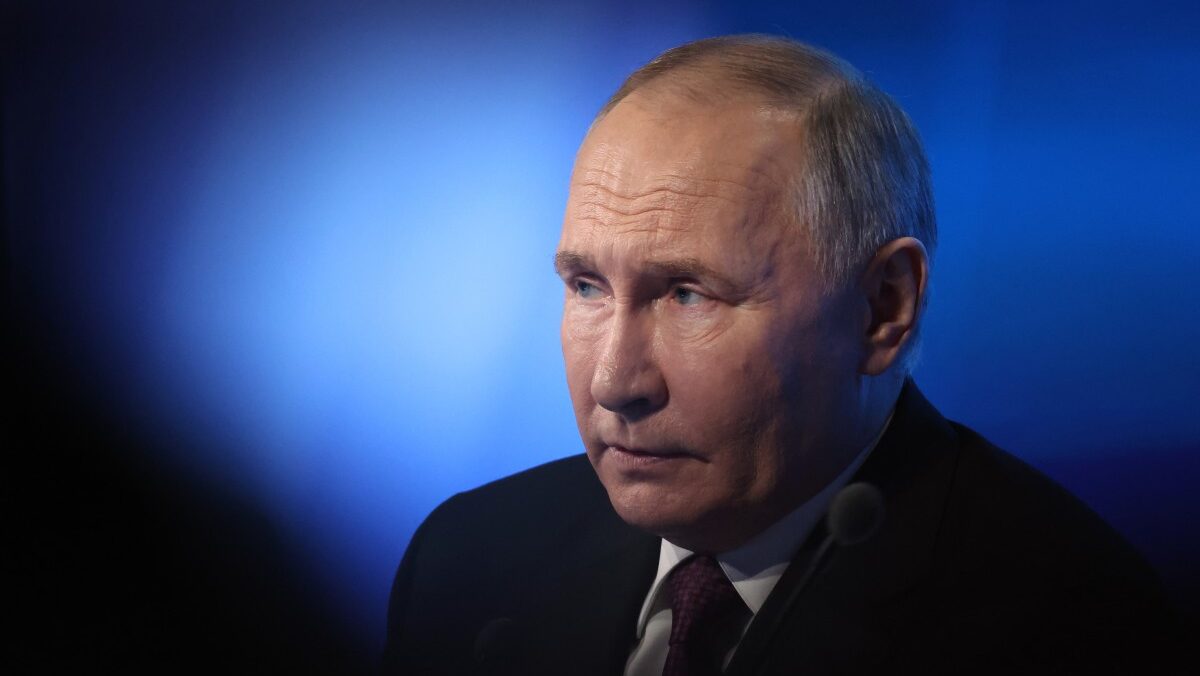
Russia’s President Vladimir Putin, April 25, 2024.
Photo: Alexander KAZAKOV / POOL / AFP
Already high tensions between Russia and NATO countries were further aggravated on Monday when Russia announced its intention to hold “tactical nuclear weapons drills,” and threatened to strike British military facilities in Ukraine or elsewhere if Kyiv uses UK-supplied missiles to attack targets inside Russian territory.
The decision to conduct drills simulating the use of tactical nuclear weapons, Kremlin spokesman Dmitry Peskov said, came in response to statements from NATO countries regarding the possibility of sending ground troops to Ukraine, which for Russia represents a “new” and “unprecedented” escalation in the conflict.
The drills, according to the Ministry of Defense, will occur in the Southern Military District, with the primary goal of the exercise being to iron out “the practical aspects of the preparation and deployment of non-strategic nuclear weapons.”
“It is obvious we are talking about statements from Mr. Macron and statements from British representatives,” Peskov said when reporters asked him what prompted the planned exercises. “They talked about the readiness and even the intention to send armed contingents to Ukraine, that is, to actually put NATO soldiers in front of the Russian military.”
“This is a completely new round of escalating tensions. It is unprecedented and requires special measures,” declared the Kremlin spokesman.
The French president, in an interview with The Economist, published late last week, doubled down on earlier comments where he stated the possibility of sending NATO troops to Ukraine ought not to be ruled out entirely. The comments sent shockwaves across Europe and unnerved some of France’s closest allies, all of whom stated they would not themselves be sending ground troops to Ukraine.
In the interview, Macron said NATO countries would “legitimately have to ask” themselves where they should deploy troops to Ukraine if “Russia were to break through the front lines, [and] if Kyiv were to make such a request.”
“I’m not ruling anything out because we are facing someone who is not ruling anything out,” Macron said, referring to his Russian counterpart Vladimir Putin.
UK Ambassador to Moscow Nigel Casey was summoned by Russia’s Ministry of Foreign Affairs on Monday over statements made by UK Foreign Secretary David Cameron days ago where he insisted Kyiv has the right to use British long-range missiles to strike targets inside of Russia.
“Just as Russia is striking inside Ukraine, you can quite understand why Ukraine feels the need to make sure it’s defending itself,” Cameron said.
In a statement published after the meeting, the Russian Foreign Ministry warned Casey that “strikes on Russian territory using British weapons” could result in the targeting of “British military facilities and equipment on the territory and beyond,” with beyond being the operative word.
Furthermore, the ministry said that Cameron’s statements “de facto recognized” that the United Kingdom” is a “party to the Russo-Ukrainian war.” It added that Moscow regards Cameron’s remarks as “evidence of a serious escalation and confirmation of London’s increasing involvement in military operations on the side of Kyiv.”
“The Ambassador was urged to reflect on the inevitable catastrophic consequences of such hostile steps by London and to immediately refute in the strongest and most unequivocal manner the bellicose provocative statements by the head of the Foreign Office,” the statement continues.
The new diplomatic low between Russia and the West comes amid a flurry of articles published by establishment press organs like Politico with titles signaling Ukraine’s imminent military defeat.
Ukraine is heading for defeat; Burns: Ukraine could lose by the end of 2024; Ukraine is at great risk of its front lines collapsing; Ukraine on edge of defeat as it waits for aid; and Biden isn’t fully convinced Ukraine can win, even with new aid.
These are just several titles of articles run by Politico in the past few weeks, and they make one wonder if, together, they act as a kind of implicit argument for sending NATO troops to Ukraine, just as articles, in the months leading up to the U.S. House of Representatives passing of the Ukraine aid bill, argued in favor of that.
Russia’s announcements come a day after former US Deputy Under Secretary of Defense Stephen Bryen, in an article titled “France has sent its first combat troops to Ukraine battlefront” published by Asia Times, claimed, without citing a source, that a unit from the Foreign Legion—about 100 soldiers—has been “deployed in support of the Ukrainian 54th Independent Mechanized Brigade in Slavyansk [Sloviansk].”
“As Slavyansk is on the frontline, this French image of a soft deployment is turning into a war with Russia directly,” Bryen writes.
“This is just the first tranche of around 1,500 French Foreign Legion soldiers scheduled to arrive in Ukraine,” he claims. “These troops are being posted directly in a hot combat area and are intended to help the Ukrainians resist Russian advances in the Donbas. The first 100 are artillery and surveillance specialists.”
While the Polish state-run news outlet TVP has picked up the story, the French Foreign Ministry has formally denied sending any troops to Ukraine, dismissing the claims as a disinformation effort.
